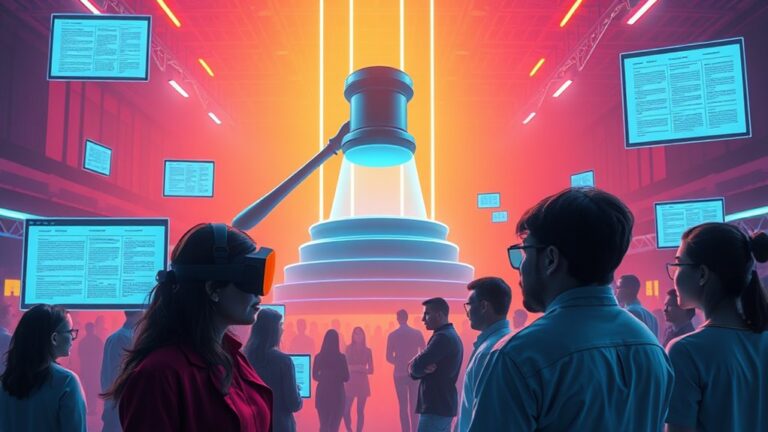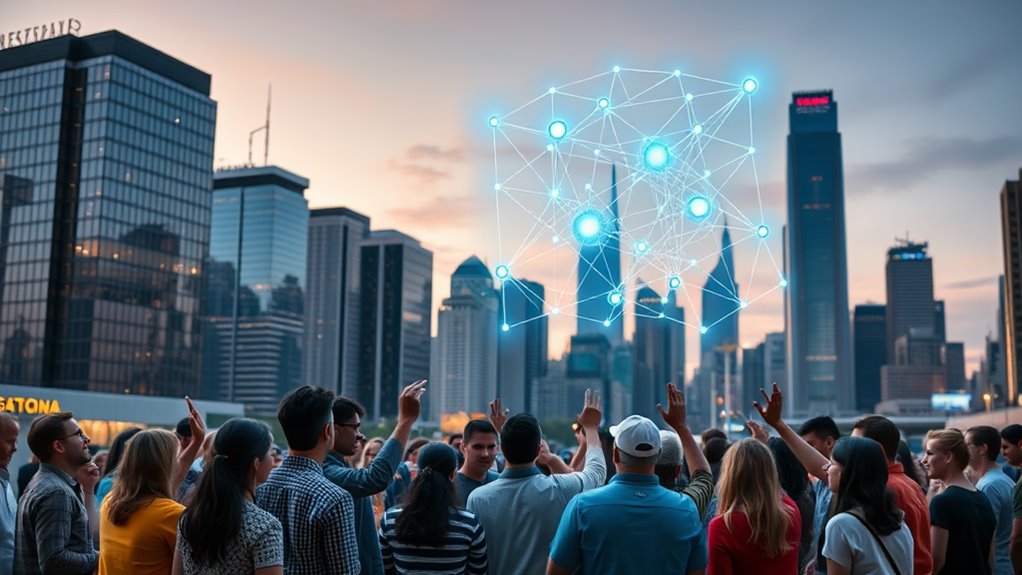
DAOs Shape the Future of Web3: How Decentralization Transforms Governance
Decentralized Autonomous Organizations (DAOs) are reshaping governance in the Web3 environment. They utilize blockchain technology to facilitate transparent and community-led decision-making. By decentralizing control, DAOs promote fair participation among members through governance tokens, which grant voting rights. However, governance models face challenges, such as potential plutocracy and decision-making complexities. As legal frameworks evolve, DAOs aim to integrate into traditional industries while fostering innovative structures. More insights on DAOs’ impact and future developments can provide deeper understanding.
Key Takeaways
- DAOs enable decentralized governance, allowing communities to make collective decisions without centralized control, fostering inclusivity and fair participation.
- Smart contracts automate governance processes, ensuring transparency and reducing corruption risks in decision-making within DAOs.
- Innovative governance models, such as quadratic voting, promote fair representation and mitigate the influence of wealthier members in DAOs.
- DAOs face challenges such as regulatory uncertainty and legal recognition, necessitating new frameworks to address these issues for effective governance.
- The integration of AI and improved blockchain scalability will enhance decision-making efficiency and support larger DAOs in the evolving Web3 landscape.
Understanding DAOs and Their Role in Web3 Governance

Decentralized Autonomous Organizations (DAOs) represent a significant shift in how governance can be structured within the Web3 ecosystem. Operating on blockchain technology, DAOs facilitate community-driven decision-making, eliminating centralized control.
Their primary goal is to create governance models that enable decentralized organization and coordinated activities. Utilizing smart contracts, DAOs automate decisions, reduce reliance on intermediaries, and enforce rules transparently.
DAOs aim to establish decentralized governance models, automating decisions and enhancing transparency through smart contracts.
Governance tokens grant voting rights to members, ensuring equitable participation in decision-making. This structure promotes community engagement and fosters collaboration.
Various types of DAOs exist, including protocol, investment, grant, social, and collector DAOs, each serving unique purposes.
The Importance of Decentralization and Transparency
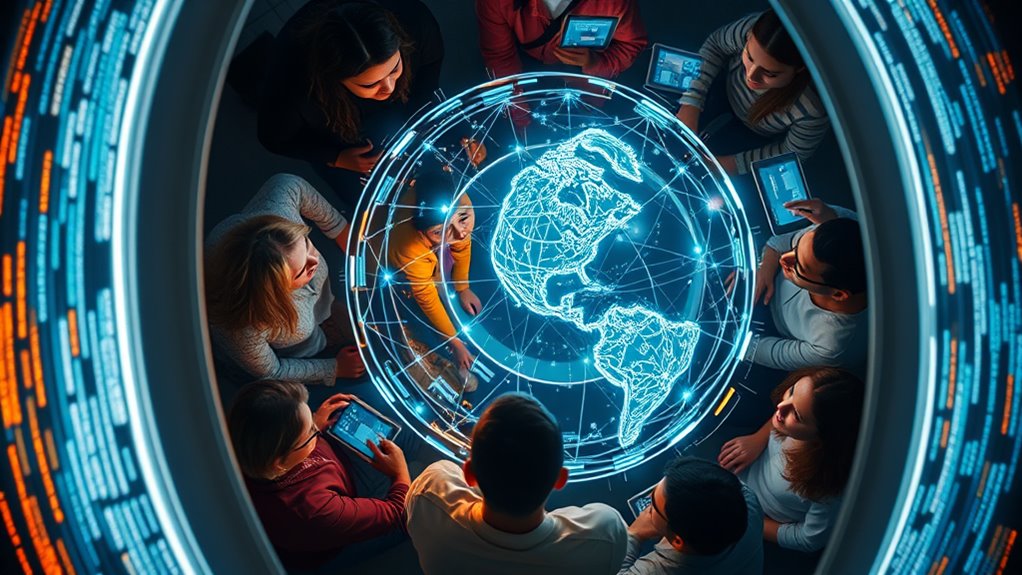
In the domain of Web3, decentralization and transparency are foundational principles that greatly enhance the functionality and trustworthiness of Decentralized Autonomous Organizations (DAOs).
Decentralized infrastructure guarantees that DAOs operate independently, free from centralized control, which promotes fair decision-making and encourages global participation. This structure enhances security by reducing reliance on central authorities, ultimately fostering autonomy.
Transparency is equally vital, as blockchain technology provides tamper-proof records of all transactions, allowing for easy auditing and accountability. Smart contracts automate governance actions, guaranteeing that all operations are visible and accessible.
Together, these principles not only empower participants but also notably reduce the potential for corruption, creating a more inclusive and trustworthy governance model that aligns with community interests.
Governance Models: Opportunities and Challenges
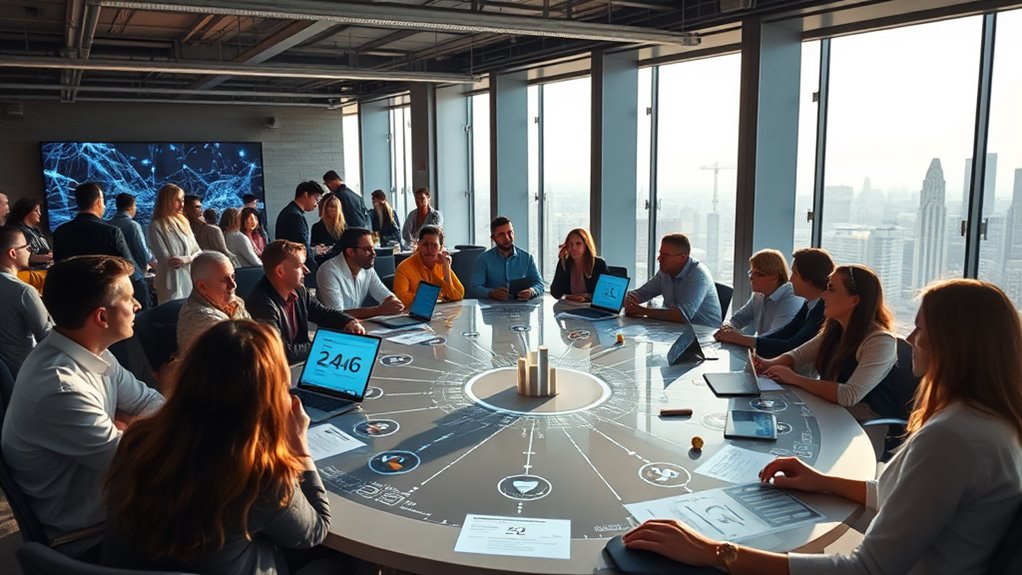
Governance models in decentralized autonomous organizations (DAOs) present both opportunities and challenges, particularly regarding participation and engagement.
While these models aim to democratize decision-making, they can inadvertently lead to plutocracy, where wealthier members exert disproportionate influence over outcomes.
Addressing these issues is essential for ensuring that all voices are heard and that governance remains equitable and effective.
Participation and Engagement Issues
How can DAOs effectively engage their members in decision-making processes? Engaging members in decentralized autonomous organizations (DAOs) presents unique challenges.
Decision complexity often slows down consensus, as significant majority approval is necessary for changes. Additionally, the diverse opinions of stakeholders can lead to conflicts or factions within the community.
As membership grows, governance processes may become overwhelmed, further hindering efficiency. To counteract voter apathy, DAOs can implement educational initiatives and community events that enhance understanding of governance.
Incentives, such as token-based rewards, can encourage participation. Addressing social barriers, including language and digital literacy issues, is essential for fostering effective communication and engagement among members, ultimately leading to more informed and inclusive decision-making processes.
Plutocracy and Influence Risks
Plutocracy poses significant risks within the governance structures of decentralized autonomous organizations (DAOs), primarily driven by the influence of wealthy members.
In many DAOs, governance is determined by token ownership, often leading to a concentration of power among affluent stakeholders. This “1 token – 1 vote” model can disenfranchise smaller participants, resulting in decisions that cater primarily to the interests of major token holders rather than the broader community.
Such imbalances can undermine the core principle of decentralization, making DAOs vulnerable to attacks and legal challenges.
To mitigate these risks, innovative solutions like quadratic voting and community engagement are essential for distributing decision-making power more equitably, thereby fostering a more inclusive governance environment.
Key Roles in DAO Governance

In the governance of Decentralized Autonomous Organizations (DAOs), the roles of founders and the influence of large token holders play a significant part.
Founders often establish the initial vision and framework, which can shape the governance structure and decision-making processes.
Meanwhile, large holders of governance tokens may wield considerable power in voting, impacting the direction of the DAO and potentially leading to imbalances in influence among members.
Founders and Governance Tokens
Founders play a crucial role in the governance of Decentralized Autonomous Organizations (DAOs), particularly during the initial stages of a project. They typically hold private keys to manage smart contracts, allowing them to intervene as needed.
As a project matures, founders gradually transfer control to the community, fostering decentralized governance. A key responsibility includes designing an effective governance structure, which outlines voting rights and decision-making processes.
Additionally, founders must engage the community to build interest and encourage participation. They also create a legal framework, ensuring that the DAO’s governance is legally binding and protects its members.
This combination of governance design and community involvement is essential for a successful DAO, setting the stage for sustainable growth.
Influence of Large Holders
How do large holders shape the dynamics of DAO governance?
Large token holders, often referred to as “whales,” wield significant voting power, which can lead to centralization risks within DAOs. Their influence may result in conflicts with smaller holders, as misaligned incentives could skew governance outcomes.
Additionally, large holders might engage in strategic trading, impacting market dynamics and liquidity. While they often prioritize short-term gains, their interests can align with the long-term health of the DAO, promoting stability.
To counterbalance their influence, governance models like quadratic voting and reputation-based systems are emerging. These approaches aim to guarantee fair representation, fostering a more decentralized environment and addressing the challenges posed by concentrated ownership in DAOs.
The Evolution of DAOs in Traditional Industries
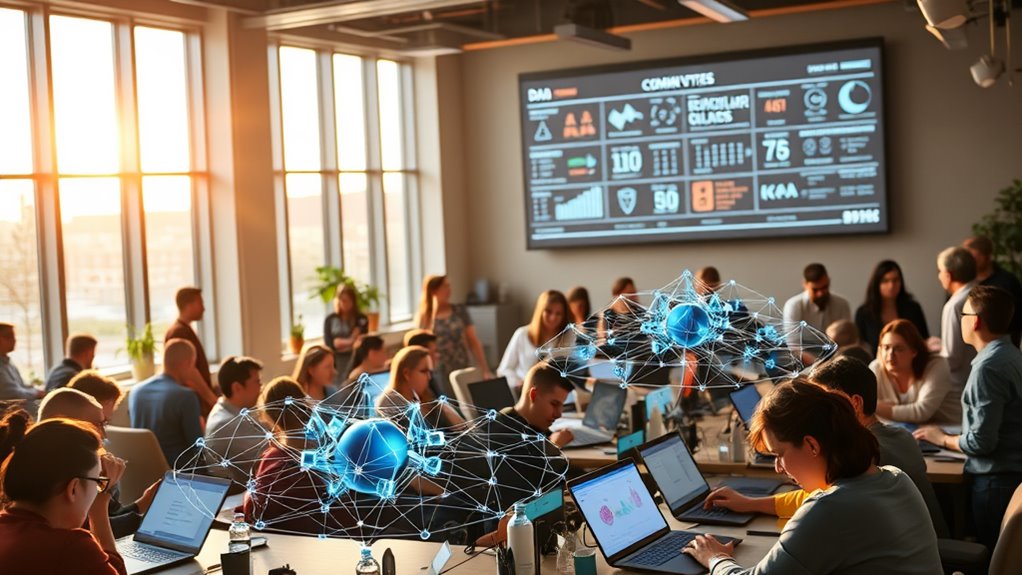
As traditional industries adapt to the digital age, the emergence of Decentralized Autonomous Organizations (DAOs) presents a significant transformation in governance and operational structures.
DAOs shift away from centralized decision-making, adopting decentralized governance models that encourage community participation. By leveraging blockchain technology, these organizations automate tasks, enhance transparency, and reduce reliance on intermediaries.
This evolution fosters innovative business models that align stakeholder incentives, promoting collective success. However, the integration of DAOs into traditional sectors faces challenges such as regulatory uncertainty, scalability issues, and security risks.
Despite these obstacles, the potential for DAOs to reshape industries is evident, as they offer new frameworks for collaboration and engagement, ultimately redefining how organizations operate in the modern economy.
The Impact of DAOs on Legal Frameworks and Regulation

The emergence of Decentralized Autonomous Organizations (DAOs) has created a need for new legal frameworks and regulatory approaches, particularly due to their unique operational structures.
Current legal challenges include a lack of clear frameworks that apply to DAOs, jurisdictional confusion from their global operations, and uncertainties regarding their recognition as legal entities.
This ambiguity raises liability concerns for members, who may face personal risks without established legal protections.
Initiatives like Wyoming’s DAO LLCs and potential frameworks in Switzerland aim to address these issues.
As DAOs integrate into Web3, traditional regulatory methods are increasingly challenged, necessitating innovative solutions that acknowledge their decentralized nature while ensuring compliance and accountability within diverse legal environments. Additionally, the evolution of crypto regulations is essential to support the integration of DAOs into the broader digital asset ecosystem.
Future Developments in DAO Governance and Technology

What advancements can be expected in the governance and technology of Decentralized Autonomous Organizations (DAOs) in the coming years?
Future developments are likely to include the integration of artificial intelligence, which can enhance decision-making and operational efficiency.
Improvements in blockchain scalability will support larger DAO operations.
Hybrid governance models may emerge, combining on-chain and off-chain elements for greater flexibility.
Interoperability will allow DAOs to collaborate across different blockchain platforms.
Additionally, smart contract optimization through AI will create more efficient agreements.
Evolving governance models, such as quadratic voting and reputation systems, will promote fairness and accountability.
These advancements aim to make DAOs more effective, inclusive, and adaptable to changing community needs.
Enhancing Participation and Education in DAOs
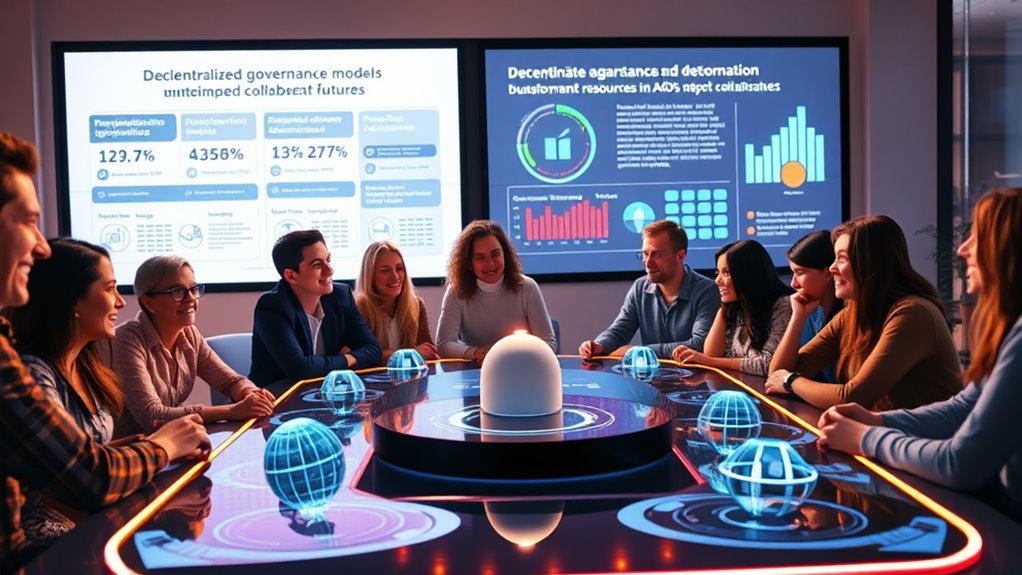
Enhancing participation and education in Decentralized Autonomous Organizations (DAOs) plays an essential role in their effectiveness and growth. To achieve this, several strategies can be employed:
- Metrics for Engagement: Track participation through proposal submissions and forum discussions.
- Voting Systems: Implement mechanisms like quadratic voting to promote fairer influence among members.
- Education Resources: Provide guides and resources to help members understand DAO governance.
- Feedback Mechanisms: Use surveys to gather insights and improve member satisfaction.
- Incentives for Contribution: Offer tokens or recognition to motivate active participation.
These initiatives not only encourage involvement but also foster a knowledgeable community, ensuring that DAOs operate efficiently and inclusively, aligning with their fundamental principles of decentralization and collective governance.
Frequently Asked Questions
How Do DAOS Differ From Traditional Organizations?
DAOs differ from traditional organizations by employing decentralized governance, allowing broad member participation in decision-making, utilizing smart contracts for operations, and fostering a flat structure that promotes inclusivity, transparency, and agility in adapting to community needs.
What Are the Risks of Participating in a DAO?
Participating in a DAO involves risks such as smart contract vulnerabilities, lack of regulation, technical complexity, financial volatility, and governance challenges. These factors can lead to inadequate representation, security breaches, and potential financial losses for participants.
Can Non-Technical Users Engage With DAOS Effectively?
Non-technical users can engage effectively in DAOs by utilizing their creative skills, participating in community management, and attending workshops. Accessible resources and streamlined processes further empower their involvement, fostering diverse contributions and enhancing overall governance.
How Are Governance Tokens Distributed Among Community Members?
Approximately 60% of governance tokens are distributed through community incentives like airdrops and grants, fostering engagement. Additionally, initial allocations often benefit founders, early contributors, and strategic partners to guarantee diverse stakeholder participation in decision-making processes.
What Happens if a Dao’s Smart Contract Is Compromised?
If a DAO’s smart contract is compromised, it can lead to significant financial losses, operational disruptions, and reputational damage, ultimately undermining trust and potentially inviting increased regulatory scrutiny, threatening the essence of decentralization.
Conclusion
To summarize, DAOs represent a significant shift in governance within the Web3 landscape, much like a river reshaping its banks over time. Their decentralized nature promotes transparency and inclusivity, while various governance models present both opportunities and challenges. As DAOs evolve, they will influence traditional industries and legal frameworks, demanding adaptability from all stakeholders. By enhancing participation and education, the future of DAOs can lead to more effective and democratic decision-making processes in an increasingly digital world.












